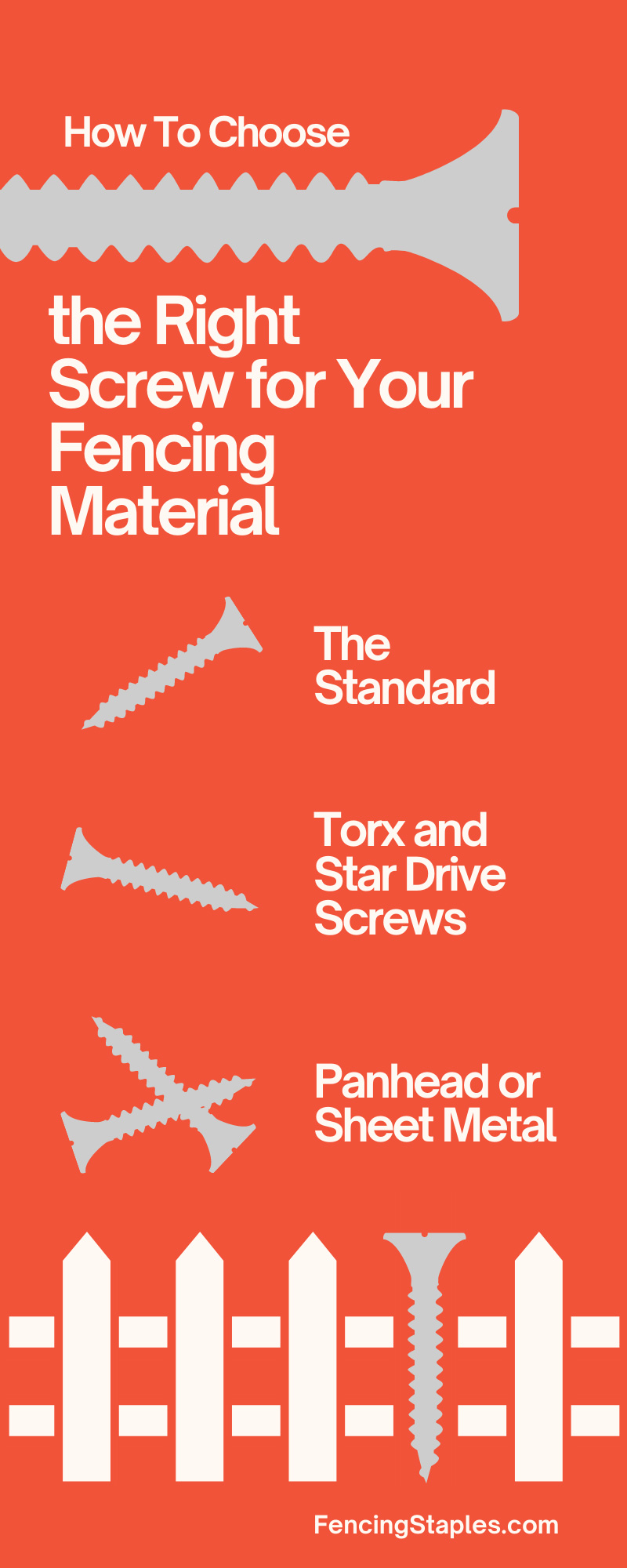No products in the cart.
Many different varieties of screws are available for projects both specific and general. If you know what kind of project you’re working on and the materials you’ll use for the job, then you’ll be able to figure out what size, type, and material to go with so you can build securely every time. Torx is preferred; it’ll save you time. By going over a few simple checks, you’ll know how to choose the right screw for your fencing material so you’ll never have to question your work.
When screws were first introduced, they weren’t the easiest tool to work with. There were only standard screws and they had high slippage rates when being screwed into materials. Then came Phillips head screws, which were revolutionary. Projects like fencing became a breeze as Phillips head screws became the universal screw and dominated over the original standard.
The design of the Phillips head screw is that of a cross that intersects, making it very easy to drive into things as opposed to the old standard. The old standard had one groove all the way across which had to be carefully maneuvered so the screw could be driven through a material.
These days, screws have come further in their designs. They’re better at fastening and stripping. Slippage is prevented as well. The Phillips head screw has now been replaced with screws such as the Quadrex, which is used by many different cordless types of drills.
Quadrex screws are fast and efficient at getting the job done. They have even more grooves which allow the speed and power of the cordless drill to drive them into virtually any surface with ease.
Much like the Quadrex, both the Torx and Star Drive screws are similarly model screws. Both have heads that grip extremely well and tend not to strip when in use, perfect for Fencing Screw. These are specific to the drill and drill bits being used, however.
They make a great standard for any job, no matter how tough the job may seem. Having options like this helps when you investigate variations in prices and sizes. Because there are so many options, you can easily get what you need.
These screws are a little more specific; they’re made to do one thing well. The general purpose of the panhead screw is for screwing metal into other materials such as wood or other metals. They’re extremely good at doing this. They have deeper grooves and longer, wider diameters to ensure they grip extremely well when fastening materials together.
Before starting any project, you should know what materials are being used. This includes even the smallest items such as fencing u-nails or Fencing Screw.
Everyone has their preference over whether they would like to use nails or screws. However, screws have a tendency not to break. They also secure well with a much higher tensile and grip strength.
When using screws indoors, there are a few options worth looking into. If you go with zinc screws, they’ll be less expensive. These screws also have a certain appeal to them; they have a polished look that’ll go along with many different indoor projects to brighten up one’s home.
When you’re considering using screws specifically designed for outdoor applications, you have a few options. Anything silicone-coated would be beneficial. Or, you could take a more practical route is simply by investing in stainless-steel screws.
Outdoor screws are designed to be protected from moisture and corrosion, as well as extreme temperatures. Once you have all this information and you understand why these conditions are crucial to choosing your screw, then you can narrow things down before you decide.
Out of all the details that you will need to know when choosing the correct materials for your construction projects, you must know the dimensions of the project. That way, you can effectively find the necessary-sized screws for the job. When you have your required items and they’re all the proper sizes for your project, you’ll save yourself a lot of time and headaches.
What you should always remember before purchasing any screw is that you must have the correct length. The general rule of thumb is that you should have a screw that’ll penetrate at least half the thickness of the bottom material. For example, if you have a 2×4, you will only need to pass the screw ¾” through the board.
After finding your footing with the length of the screw, take a look at the diameter. This is the second most important rule of thumb that you should always use when choosing the right screw for your project.
When choosing diameters, it is important to know that screws are sized by gauges, which are typically ranged from two to sixteen. Gauge eight is the most acceptable gauge for most unspecific instances.
This means—unless you have guidelines for a job—you can use this gauge, and it should work fine for any project. If you have a heavier duty project, then use gauges on the upper end, such as twelve through fourteen.
If you’re working on a simple project—such as a light woodworking project, for example—go on the lower end of the gauges and use something like a gauge six.
Fence building can get complicated if you don’t know what to use to assemble it. Hopefully, this guide will help you to know how to choose the right screws for your fencing material the next time you need to build or repair your fence. Now you can show off your skills the next time you’re out shopping for screws or while working on your fence.

Your questions drive us! Connect with Cat’s Claw Fastenerss and reach out to our Head Cat Collector, Ralph, via email at ra***@***************rs.com. Stay informed with the latest blog posts and follow us on Facebook, Instagram, Pinterest, and Youtube for more!
Read Next: The Benefits of Installing a Privacy Fence

Lori levin says:
I have an aluminum picket “estate fence” around my yard. Screws are loosening and was told that stainless steel screws into aluminum is a set up for corrosion. I never thought of that, but certainly remember I was told not to mix metals for that reason on gutters. Do you have a suggestion for this problem? It would b a lot of screws to change, but need not be all at once. Also, there are 800-1000 of them. Anything like Loctite is sold in little tubes—too small for this job.
Toby-Jeanne Almy says:
Boy howdy, we are just seeing your comment friend! You are correct, mixing metals is a recipe for disaster. We wish we had a good solution for you, but we are equally stumped!